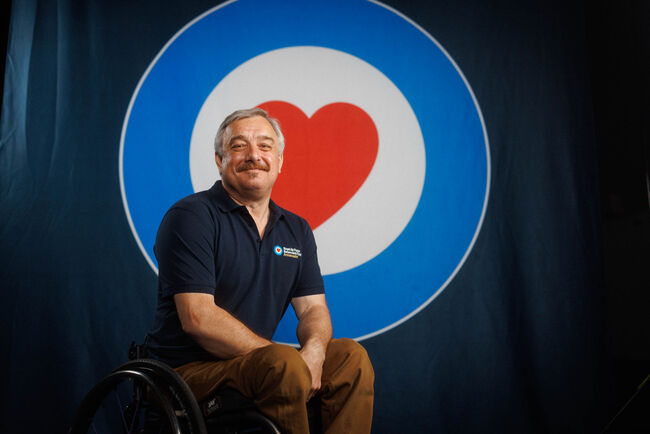
"40 years on from the parachute accident that changed my life"
Published:
Categories:
To mark 40 years since the life-altering parachute accident that left him paralysed, former RAF Parachute Instructor and Fund Ambassador Bob Greig reflects on how far he’s come.
Forty years ago, Bob Greig’s life changed forever. It was an ordinary day for Bob, taking part in a routine training programme from a Puma Helicopter at 6,000ft - something he had done many times before in his RAF role as a Parachute Jump Instructor.
Bob recalled: "I was the last to exit from the Puma Helicopter at 6,000 feet. But when I jumped, my parachute and the reserve both failed to deploy.
"When I impacted the ground I instantly knew I was paralysed but I also realised how very lucky I was to be alive. I hit the ground not far off the Drop Zone, in a farmers’ field that had recently been ploughed over. In addition, I’d chosen to wear an alternative pair of jump boots that day which had a 2.5inch solid rubber sole and helped absorb some of the impact"
Bob considers himself to be ‘a very lucky boy on a very unlucky day.’ He further explained: "One of the students jumping that day was a qualified medic and had on him his full field medical kit. And, as luck would have it, the Puma Helicopter was able to ‘put down’ metres away from me in the ploughed field, thus facilitating an extremely quick extraction and almost immediate access to medical care at the John Radcliffe Hospital in Oxford."
Following his accident, Bob was left with a spinal cord injury, a broken back and a dislocated and shattered jaw. He underwent months of rehabilitation at the National Spinal Injuries Centre at Stoke Mandeville Hospital, and has been a permanent wheelchair user ever since.
However, Bob has come a long way since his accident and embraces life to the full, living independently in the community. According to Bob, this would have been much more difficult without the support of the Fund.
"Since my accident, my life has been greatly enhanced by the support I have received from the Fund. In the early days of my treatment, they provided a grant to ensure I was financially stable. The Fund bought me with a property which was adapted to meet my physical needs for then, now and will continue to do so into the future. The Fund also funded a lightweight wheelchair. I have my independence in no small part due to the huge input from the charity."
When asked how it feels to reach the 40th anniversary of his accident, Bob said: "It sounds very simplistic, but it just reminds me of how lucky I am and to treat every day as a bonus. Reaching 40 years with a spinal cord injury is an achievement in itself but to be honest, I just get on with things. The Fund’s support has empowered me to redefine my boundaries and helped in giving me the confidence to independently take part in society."
Not surprisingly, there have been some challenges for Bob along the way following his accident. He explained: "There isn’t really one big challenge that I have faced, rather than recurrent daily challenges which come with being a permanent wheelchair user, living in a society which is both physically and psychologically full of barriers.
"Thankfully, these challenges are easier to overcome thanks to the continued support of the Fund."
Bob continued: "Being a parent and grandparent are without a doubt two of my most satisfying achievements, for back in 1984 both concepts were deemed implausible as a paraplegic.
"It’s amazing to have watched my daughter move into adulthood and see my grandchildren readying themselves for life; it's just wonderful."
For others who have been through a life-changing experience which has impacted them physically, Bob advises: "It’s so important to pay attention to your own needs and have in place plans for when situations go awry. You cannot realistically expect to have a life-changing experience and think you can disregard the changes in one’s personal needs that are forced upon you. Like the military saying goes, ‘Planning & Preparation, Prevents Poor Performance’ – planning will help you remain independent and maintain your quality of life.
"I always ensure I have a ‘fall back’ just in case a ‘barrier’ presents itself. It sounds mundane but it’s important, for without it, you may well undermine your own self confidence."
Reflecting on where he is now, Bob concludes: "The impact of the Fund’s support on my quality of life over the last 40 years, is truthfully unquantifiable. I’m certain that without the life-long support provided, I wouldn’t have been able to achieve what I have.
"The RAF Benevolent Fund has been there by my side since the 28th June 1984 and I am constantly reassured of the charity's presence, today and tomorrow."